The early season has several distinct advantages that can help you find quick success in the deer woods. Too many people look to luck when they should be looking to preparation. On this episode I talk about three tips that helped me shoot my buck during this deer hunting season.
All of these tips can be summarized in one word, preparation. Once you get into your tree stand or hunting blind, the vast majority of factors that can contribute to your success are behind you. Yes, you still need to do many things well to be quiet, still, smart, judge distance, take good shots, etc. But those things can only happen if deer have a reason to get within range of you.
Preparation is the unfair advantage that often makes the difference between seeing nothing and consistent success.
Listen to this episode for the three tips that helped me land my early season buck this year. Photo below.

DCIM100GOPROGOPR2454.JPG


